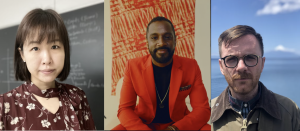Georgetown University awarded three associate professors the inaugural Magis Prize, which grants $100,000 to professors whose work has an important impact on their field and on students, the university announced Sept. 5.
Funded by an anonymous donor, the prize allows the three professors — Diana Kim, an Asian studies professor in the School of Foreign Service (SFS); Timothy Newfield, a history and biology professor in the College of Arts & Sciences (CAS); and Carlos Simon, a Grammy-nominated composer in the performing arts department in the CAS — funding for their research and two semesters of leave.
The funding will begin this academic year and continue over the next three years and recipients are to involve students in their studies; at the close of the three years, the recipients will meet with the Center for New Designs in Learning and Scholarship (CNDLS), a Georgetown organization aimed at supporting faculty, to discuss a place for their research in Georgetown’s curriculum.
“The Magis Prize is another way that Georgetown is seeking to support faculty in creating new ideas, deepening human understanding and pushing the boundaries of knowledge,” Provost Robert M. Groves said in the announcement. “It is also another way to give students an opportunity to work with the most productive faculty at Georgetown.”

Kim, who started teaching at Georgetown in 2016, will use the prize money to help her write her next book, titled “Untouchability as Global.” The book focuses on stigmatization of untouchables — people in the lowest castes in a caste system, a strict stratification system in which someone is born into a hierarchical social group and typically has no social mobility.
Kim said that she was surprised to be named a recipient and that the award creates new opportunities to expand her research.
“I found out just a few days before the announcement was made itself, and I was really surprised,” Kim told The Hoya. “I was really grateful. I know it’s sounding so obvious, but it’s a really generous award, both in terms of time and financial support. So it’s like one of those things that when you’re applying, you think, ‘Ah, how amazing would it be if I get that? I could do so many things.’ And then when you’re told you’re the recipient, along with these two other super cool scholars, my mind kind of stopped, and I was like, ‘Holy crap. What can I do?’”
Newfield, who has taught at Georgetown since 2017 and has researched history, biology, medical humanities and medieval studies with students, said he plans on using the grant money from the prize to continue this research.
“I work at the intersection of a few disciplines — history, disease ecology, epidemiology and evolutionary biology — in order to study, in a science-heavy way, the history of infectious disease,” Newfield wrote to The Hoya. “The Magis will be directed toward using these disciplines in order to better our understanding of the history of past disease emergence, specifically that of smallpox.”
Ella Lowry (CAS ’26), one of Newfield’s students in his course “Global Health History,” said that she sees his intersectional work as extremely important.
“As a student in Professor Newfield’s class, I have developed a great understanding and appreciation for the importance of intersectionality in research and scholarship,” Lowry wrote to The Hoya. “His work that combines history and infectious diseases is very unique and important in the context of current global health.”
Simon will use the grant money to compose an original opera titled “The Highlands” for the Metropolitan Opera. The opera will touch on societal issues such as climate change and the effects of racism.
Kim added that the requirement of engaging students in their research is meaningful to her because she has worked with Georgetown students on her research in the past.
“It was also because the prize was so explicitly designed to bring in students that it was super cool for me, because I had been working over the past few years with a few both undergrad and MA students who had helped me deal with languages that I wasn’t fluent in,” Kim said. “They were helping me kind of explore what this group looks like and historical records, but it has always been on a smaller scale, because it takes a lot of involved research. So I kind of imagined, well, I’d be able to scale this up and work with more students.”